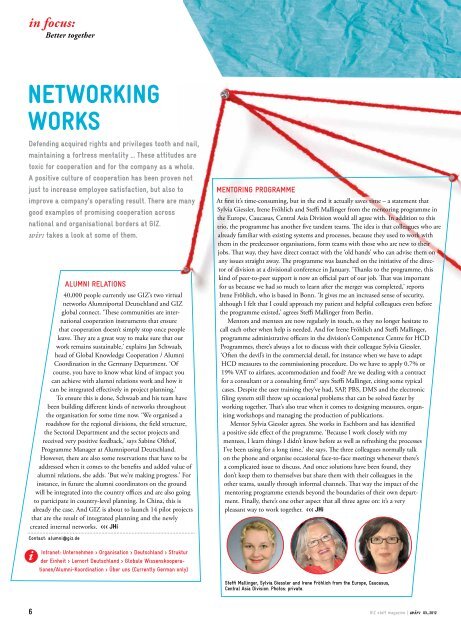03-wir-03-2012-english
You also want an ePaper? Increase the reach of your titles
YUMPU automatically turns print PDFs into web optimized ePapers that Google loves.
in focus:<br />
Better together<br />
Networking<br />
works<br />
Defending acquired rights and privileges tooth and nail,<br />
maintaining a fortress mentality ... These attitudes are<br />
toxic for cooperation and for the company as a whole.<br />
A positive culture of cooperation has been proven not<br />
just to increase employee satisfaction, but also to<br />
improve a company’s operating result. There are many<br />
good examples of promising cooperation across<br />
national and organisational borders at GIZ.<br />
<strong>wir</strong>: takes a look at some of them.<br />
Alumni relations<br />
40,000 people currently use GIZ’s two virtual<br />
networks Alumniportal Deutschland and GIZ<br />
global connect. ‘These communities are international<br />
cooperation instruments that ensure<br />
that cooperation doesn’t simply stop once people<br />
leave. They are a great way to make sure that our<br />
work remains sustainable,’ explains Jan Schwaab,<br />
head of Global Knowledge Cooperation / Alumni<br />
Coordination in the Germany Department. ‘Of<br />
course, you have to know what kind of impact you<br />
can achieve with alumni relations work and how it<br />
can be integrated effectively in project planning.’<br />
To ensure this is done, Schwaab and his team have<br />
been building different kinds of networks throughout<br />
the organisation for some time now. ‘We organised a<br />
roadshow for the regional divisions, the field structure,<br />
the Sectoral Department and the sector projects and<br />
received very positive feedback,’ says Sabine Olthof,<br />
Programme Manager at Alumniportal Deutschland.<br />
However, there are also some reservations that have to be<br />
addressed when it comes to the benefits and added value of<br />
alumni relations, she adds. ‘But we’re making progress.’ For<br />
instance, in future the alumni coordinators on the ground<br />
will be integrated into the country offices and are also going<br />
to participate in country-level planning. In China, this is<br />
already the case. And GIZ is about to launch 14 pilot projects<br />
that are the result of integrated planning and the newly<br />
created internal networks. Lernort Deutschland > Globale Wissenskooperationen/Alumni-Koordination<br />
> Über uns (Currently German only)<br />
Steffi Mallinger, Sylvia Giessler and Irene Fröhlich from the Europe, Caucasus,<br />
Central Asia Division. Photos: private.<br />
6 GIZ staff magazine | <strong>wir</strong>: <strong>03</strong>_<strong>2012</strong>


